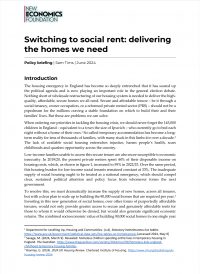Publications Switching to social rent Delivering the homes we need through the Affordable Homes Programme By Sam Tims 06 June 2024 Download the report The housing emergency in England has become so deeply entrenched that it has soared up the political agenda and is now playing an important role in the general election debate. Nothing short of wholesale restructuring of our housing system is needed to deliver the high-quality, affordable, secure homes we all need. Secure and
Topics:
New Economics Foundation considers the following as important:
This could be interesting, too:
Robert Vienneau writes Austrian Capital Theory And Triple-Switching In The Corn-Tractor Model
Mike Norman writes The Accursed Tariffs — NeilW
Mike Norman writes IRS has agreed to share migrants’ tax information with ICE
Mike Norman writes Trump’s “Liberation Day”: Another PR Gag, or Global Reorientation Turning Point? — Simplicius
Switching to social rent
Delivering the homes we need through the Affordable Homes Programme
06 June 2024
The housing emergency in England has become so deeply entrenched that it has soared up the political agenda and is now playing an important role in the general election debate. Nothing short of wholesale restructuring of our housing system is needed to deliver the high-quality, affordable, secure homes we all need. Secure and affordable tenure – be it through a social tenancy, owner occupation, or a reformed private rented sector (PRS) – should not be a pipedream for the millions craving a stable foundation on which to build their and their families’ lives. But these are problems we can solve.
When ordering our priorities in tackling the housing crisis, we should never forget the 145,000 children in England – equivalent to a town the size of Ipswich – who currently go to bed each night without a home of their own. So-called temporary accommodation has become a long-term reality for tens of thousands of families, with many stuck in this limbo for over a decade. The lack of available social housing entrenches injustice, harms people’s health, scars childhoods and quashes opportunity across the country.
Low-income families unable to access this secure tenure are also more susceptible to economic insecurity. In 2019/20, the poorest private renters spent 44% of their disposable income on housing costs, which, as shown in figure 1, increased to 59% in 2022/23. Over the same period, this housing burden for low-income social tenants remained constant at 33%. The inadequate supply of social housing ought to be treated as a national emergency, which should compel clear, sustained political attention and policy focus from whomever forms the next government.
To resolve this, we must dramatically increase the supply of new homes, across all tenures, but with a clear plan to scale up to building the 90,000 social homes that are required per year. Investing in this new generation of social homes, over other forms of purportedly affordable tenures, would not only provide greater access to secure and genuinely affordable rents for those to whom it would otherwise be denied, but would also generate significant economic returns. The combined socioeconomic value of building 90,000 social homes in one single year is estimated to deliver net economic benefits of £11.9bn over 30 years, breaking even after 11 years to thereafter deliver positive returns.
Topics Housing & land




